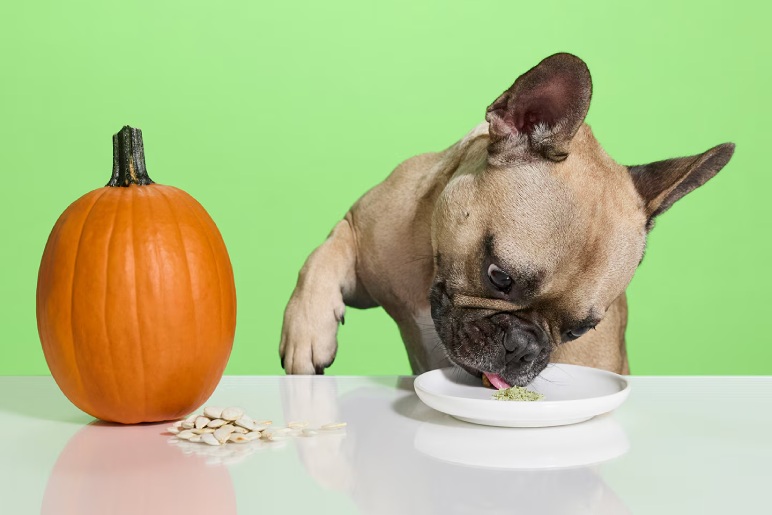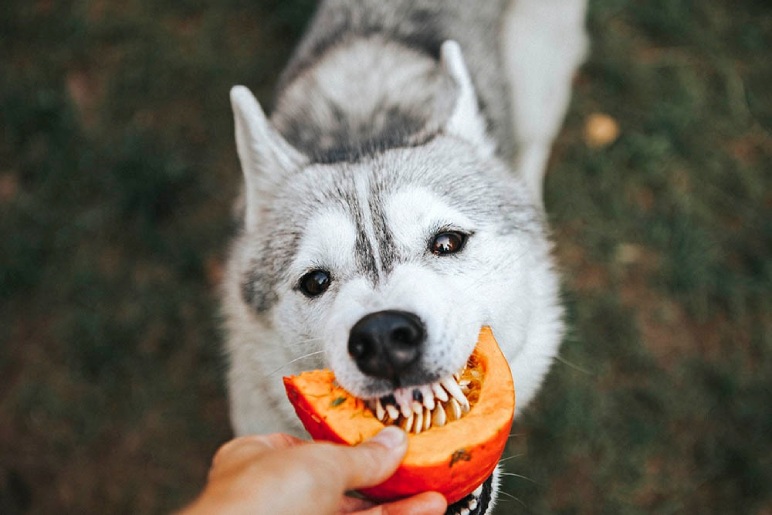As a responsible dog owner, it’s natural to wonder which human foods are safe for your dog to enjoy. Among the many foods that come to mind, can dogs eat pumpkin seeds? is a question that’s commonly asked. Whether you have a large dog like the XL bully or a smaller breed like the pocket bully puppies, it’s crucial to understand how different foods impact their health. In this blog, we’ll explore whether pumpkin seeds are a safe and nutritious snack for your dog, as well as how to introduce them to your dog’s diet, if they are indeed a healthy choice.
The Nutritional Benefits of Pumpkin Seeds

Pumpkin seeds, also known as pepitas, are packed with essential nutrients, making them a popular snack for humans. But are they suitable for dogs? Let’s take a look at the nutritional profile of these seeds and how they could benefit your dog.
Pumpkin seeds are rich in fiber, vitamins, and minerals such as zinc, magnesium, and iron. They also contain healthy fats, which can help support a dog’s coat, skin, and overall well-being. Additionally, these seeds are known to contain antioxidants, which can combat inflammation and oxidative stress in your dog’s body.
Are Pumpkin Seeds Safe for Dogs?

The short answer is yes – dogs can eat pumpkin seeds, but there are some important considerations to keep in mind. First, it’s essential to feed pumpkin seeds in moderation. While these seeds are packed with nutrients, giving your dog too many can lead to digestive issues, such as diarrhea or stomach discomfort. It’s always best to offer a small amount at first and monitor your dog’s reaction.
Pocket Bully UK and Patterdale Terrier owners, in particular, may find that their dogs have sensitive stomachs. These breeds, while strong and robust, may not always be able to handle certain foods as well as larger breeds like the XL bully. So, when introducing new foods, like pumpkin seeds, it’s always a good idea to go slow and ensure that your dog isn’t having any adverse reactions.
How to Safely Feed Pumpkin Seeds to Your Dog

If you’re thinking of introducing pumpkin seeds to your dog’s diet, here are some helpful tips on how to do it safely:
- Remove the Shell: While pumpkin seeds are safe for dogs, the shell can be difficult for them to digest. It’s best to offer your dog unshelled pumpkin seeds (pepitas) to avoid choking hazards and digestive discomfort.
- Go for Raw or Roasted Seeds: Always opt for raw or roasted pumpkin seeds without added salt, sugar, or seasonings. Salt and spices can be harmful to your dog and should be avoided at all costs.
- Introduce Gradually: Start with a small portion of pumpkin seeds, perhaps 1 or 2 seeds per day for small breeds like the pocket bully puppies. If your dog enjoys the treat without any issues, you can increase the amount slowly.
- Observe for Reactions: Keep an eye on your dog after they consume pumpkin seeds. If they show signs of stomach upset, like vomiting or diarrhea, stop feeding them the seeds and consult your veterinarian.
- Keep It Balanced: Pumpkin seeds should be viewed as a treat or supplement, not a replacement for your dog’s regular food. They should only be given in small quantities as part of a well-balanced diet.
Can Pumpkin Seeds Help with Dog Health?

In addition to being a delicious snack, pumpkin seeds can offer several health benefits for your dog. Here are some ways these seeds can contribute to your dog’s health:
1. Supports Digestive Health:
The high fiber content in pumpkin seeds can promote regular bowel movements, helping to support a healthy digestive system. If your dog is experiencing constipation, pumpkin seeds might be an effective natural remedy.
2. Parasite Control:
Some studies suggest that pumpkin seeds have properties that may help eliminate intestinal parasites in dogs, such as tapeworms. The compounds in pumpkin seeds may help to expel these parasites naturally.
3. Supports Urinary Health:
The antioxidants in pumpkin seeds can help support kidney and urinary health, which is especially important for certain breeds prone to urinary issues.
4. Promotes Healthy Skin and Coat:
The zinc and fatty acids in pumpkin seeds contribute to healthier skin and a shinier coat. If you have a dog with dry skin or shedding issues, adding these seeds to their diet may improve their skin health over time.
The Role of Pumpkin Seeds for Specific Dog Breeds

If you own a breed like the XL bully, you might be wondering how pumpkin seeds specifically affect larger dogs. These dogs often have higher energy needs and may be more prone to digestive issues due to their size and metabolism. Incorporating healthy, fiber-rich foods like pumpkin seeds can support their overall health by improving digestion and providing essential nutrients.
For Pocket Bullys, both in the UK and abroad, their smaller size and energy levels mean that they often need carefully managed diets. While pumpkin seeds can provide valuable nutrients, it’s crucial not to overfeed them. These dogs may be more sensitive to treats, so moderation is key.
Breeds like the Patterdale Terrier are known for their agility and energy, so providing them with healthy snacks can help maintain their vitality. Pumpkin seeds can be a beneficial part of their diet, but again, it’s vital to limit the quantity to avoid any digestive upsets.
Conclusion: Are Pumpkin Seeds Right for Your Dog?

In conclusion, dogs can eat pumpkin seeds in moderation, and they offer several health benefits such as improved digestion, parasite control, and healthier skin and coat. Whether you have a Pocket Bully UK, an XL bully, or a Patterdale Terrier, adding pumpkin seeds to your dog’s diet can be a healthy treat option if given correctly.
If you’re unsure about introducing new foods to your dog’s diet, or if you’re concerned about any potential side effects, it’s always a good idea to consult with your veterinarian. They can help guide you based on your dog’s individual health needs and provide the best advice. If you’re a dog owner in need of training advice or professional help with your pet’s behavior, look no further than Dog Trainer Liverpool. We specialize in dog behavior and training, ensuring your pet gets the best care possible. For expert advice, please call us today at 07956 921111. Whether you’re dealing with behavioral issues or need guidance on diet and nutrition, our team is here to support you and your dog every step of the way!
Have A look:
